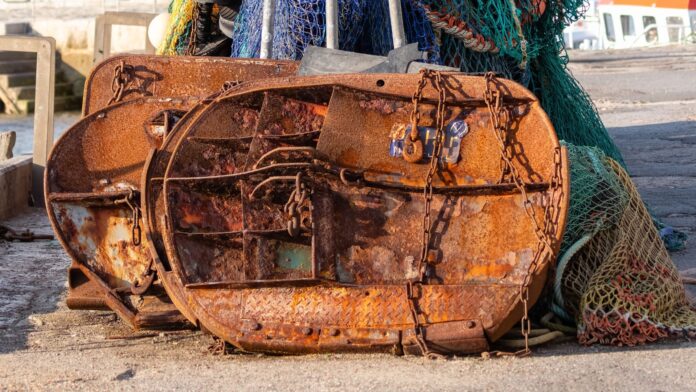
Oceana UK has revealed that the UK’s marine ‘protected’ areas were subjected to over 33,000 hours of suspected bottom trawling in 2023, according to new analysis of data. This form of fishing is destructive to seafloor habitats as bottom-towed gear effectively bulldozes the seabed, as well as being detrimental to sealife with its extremely high rate of bycatch, scooping up untargeted wildlife. Despite this, it is permitted in almost all UK marine protected areas (MPA).
New analysis of satellite data from Global Fishing Watch shows that over 100,000 hours of apparent industrial fishing took place within the UK’s offshore marine protected areas in 2023 – of which 33,000 hours were from vessels carrying destructive bottom-towed gear, such as bottom trawls and dredges.
These MPAs are designated to protect rare, threatened or important ocean habitats and species to ensure healthy marine environments, yet, this latest data indicates that industrial bottom-trawl vessels continue to drag heavy gear and nets – which can be as large as a football field and weigh several tonnes – across the seafloor in supposed marine sanctuaries.
10 fishing vessels account for a quarter of this destructive activity
Just 10 fishing vessels – all at least 20 metres in length – were responsible for over a quarter (27%) of the suspected bottom trawling identified by the analysis, demonstrating the intense nature of this damaging practice. None of these 10 vessels were from the UK, and just 6% of the total 33,000-plus hours of suspected bottom trawling in these MPAs was carried out by UK vessels.
Hugo Tagholm, Executive Director of Oceana UK, said: “Our marine ‘protected’ areas are crisscrossed with the scars of this highly destructive form of fishing, which may take decades to heal. These areas are vital havens for ocean wildlife and protect us against the climate crisis. Everything from sharks to starfish are hoovered up by bottom trawling, which can destroy whole ecosystems and empty our seas of life.”
Martin Attrill, Professor of Marine Ecology at Plymouth University: “Over a century of industrial bottom trawling and dredging has degraded the UK seabed and still threatens some of our remaining most important and sensitive marine habitats, impacting further the biodiversity and resilience of our seas. It is therefore frankly astounding that these harmful practices are still permitted in marine protected areas, designated to protect the seabed and allow nature to recover. When this particular destructive pressure is removed, our research in places like Lyme Bay shows that these marine ecosystems can bounce back, bringing wide ranging benefits. As seabed species and habitats recover, they can build up ‘blue’ carbon that helps to mitigate the climate crisis, they boost marine biodiversity and the abundance of commercial species inside and outside MPAs, with benefits to the UK fishing industry and other marine sectors, and by giving some space to nature they help restore the overall health of our seas.”
Biodiversity hotspots at risk
The two most exploited sites were both located off the coast of Cornwall. The Western Channel MPA is made up of underwater sand dunes that are home to wildlife ranging from the small-spotted cat shark to the angler fish. It performs a vital role by bringing nutrients from cooler, deeper waters to the surface, stimulating food chains that support an abundance of ocean life.
The Southwest Deeps (East) is also a crucial biodiversity hotspot, boasting cuckoo rays as well as the fan mussel, one of Britain’s largest and most threatened molluscs. This site also stores an estimated 1.67 megatonnes of carbon, which is equivalent to carbon emissions from over 1 million return flights from London to Sydney.
Urgent political action
Ahead of the UK general election, Oceana UK is calling for decisive political action on destructive fishing, urging all political parties to commit to a complete ban on bottom trawling across all marine protected areas. Polling by Oceana has shown that more than three quarters of the UK public support such a ban.
The UK Government is set to begin a consultation on proposed measures for the majority of England’s remaining offshore MPAs this spring; during which Oceana will continue to push for stronger measures that protect MPAs in their entirety.
In line with legal pressure from Oceana in 2021, the UK Government has committed to restricting bottom trawling in the UK’s offshore MPAs, and has been introducing byelaws to protect certain features – such as reefs – within MPAs on a site-by-site basis, with the latest of these due to come into force on 22 March 2024.
The introduction of these byelaws is an important step, but this limited restriction still leaves the vast majority of the UK’s protected areas open to this harmful practice.










